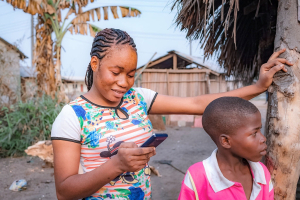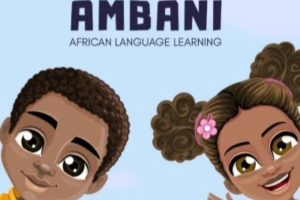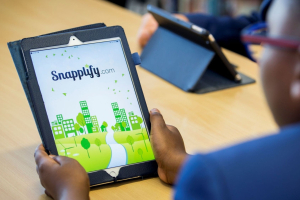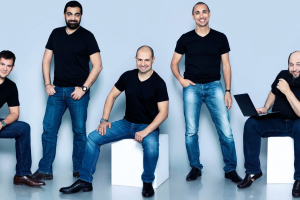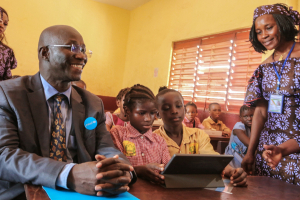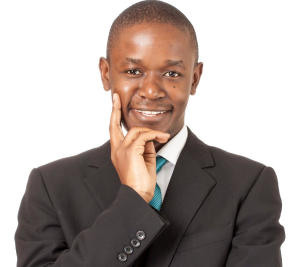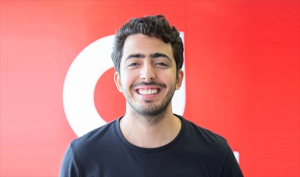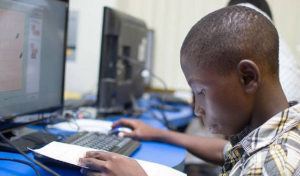Temitope Ogunsemo develops edtech solutions for academic institutions
Krystal Digital was founded by an experienced entrepreneur in the information and communication technology sector, who recognized the need for better information management in Nigerian schools after facing issues getting his college transcript.
In Nigeria, Temitope Ogunsemo is one of the leading figures in the booming edtech segment. He is the founder and CEO of Krystal Digital Network Solutions, which develops edtech solutions to help reduce absenteeism and enhance the skills of Nigerians.
Krystal Digital was founded in 2010 as a result of the founder's difficult and frustrating experience in retrieving his college transcripts. In response, he launched MySkool Portal, a web application that allows efficient school information management by ensuring proper documentation of school data. This marked the birth of Krystal Digital.
"Krystal Digital emerged as a result of my difficult and frustrating experience when I attempted to get hold of my academic transcript. In a bid to tackle such issues, I developed a school information management system for government-owned secondary schools, spearheaded by King’s College, Lagos. By virtue of the value proposition offered by my organization, the principal of the school liked the product so much, he asked other principals in his network to adopt a similar technology, and Krystal Digital was born," said Temitope Ogunsemo in 2019.
MySkool Portal is now used in more than 20 states in Nigeria, with over 50 institutional clients, including public high schools. It has more than 75,000 active students, bringing Krystal Digital's annual revenue to more than NGN1.1 billion ($2.4 million).
Mr. Temitope Ogunsemo is a graduate of the University of Ibadan, where he earned a bachelor's degree in chemistry in 2008. He also graduated from the University of Salford in the UK, where he earned a master's in information technology. He has worked as a software engineer on several projects and has received several national and international awards.
In 2017, the ECOWAS Youth Council distinguished him as the West African Personality of the Year. In 2018, he was named by Forbes magazine as one of the 30 most promising young African entrepreneurs, and his MySkool Portal app was chosen as the school management software of the year at the Nigeria Technology Awards. He also received the Most Entrepreneurial Organization in Information and Communication Technology award for his company at the 2018 Nigeria Entrepreneurs Awards.
Melchior Koba
Edtech can grealy reduce nonenrolment rate, World Bank research finds
In Africa, the lack of financial resources is not the only factor that affects access to education. The social environment can sometimes also be an obstacle. In those conditions, the well-directed use of ICT tools can address the issue.
ICT tools can be beneficial in many ways for children’s education, according to the World Bank. The international institution makes this assumption based on the experiment it facilitated, between 2018 and 2020, in the States of Kano and Jigawa, in Northwest Nigeria. The experiment involved 9393 rural households whose children aged 6 to 9 and their parents were subjected to two digital learning approaches. The approaches led to a 42% drop in the nonenrolment rate.
The baseline sample selected by the World Bank included 2,335 households in 32 communities that received only aspirational videos for parents to change their mindset and wish for better for their children. Also, 2,345 households in 32 communities received aspirational videos, and 40% of them also received a smartphone with educational content. 4,713 households in 64 communities served as a control group.
The results, documented in the “Improving Enrollment and Learning through Videos and Mobiles Experimental Evidence from Northern Nigeria” policy research paper demonstrate that aspirational videos alone reduced girls' aspirations to marry at the ages of 15 to 18. The videos had the greatest impact on the girls' parents. In households that received the aspirational videos and the smartphone, children's literacy and numeracy skills improved by 0.46 points and 0.63 points, respectively, compared to the control group.
According to the World Bank, no evidence of heterogeneous effects by gender was found overall, "highlighting the potential of edtech to also effectively reach girls in conservative settings, where girls' seclusion or a strong bias towards boys’ education may prevent girls from accessing formal schooling."
"Our heterogeneous analysis by gender shows that the interventions worked for both girls and boys and that the magnitude of treatment effects across gender were generally similar for the main outcomes (school enrollment, and literacy/numeracy skills),” the research paper informs.
Social pressure, a barrier to education
The research reveals that since smartphones are often used by multiple household members in low-resource settings, the resources provided for the experiment improved the literacy and numeracy skills of older, non-targeted siblings, reduced early parenthood among adolescents living in targeted households, and reduced early labor market entry.
For the World Bank, this is bonanza. In its 2019 Reading and Access Research Activity report, the institution revealed that northern Nigeria was significantly behind the national average in terms of education. Less than 3 percent of second graders in public elementary schools could read Hausa text with 80 percent or better comprehension. In the northwest, only 29 percent of women aged 15-49 and 59 percent of men were literate. Only 40 percent of 30-34-year-olds were educated in the northeast and northwest zones, compared to 90 percent in the southeast and southwest regions of the country.
The study believes the situation in the northwest is due to the strong adherence of the population to traditional norms. The formal legal institution of Sharia law, which applies in most northern states and covers social, civil, and criminal matters, has reinforced social norms that encourage early marriage among adolescents and thus early pregnancy. All of this represents additional barriers to education. The emergence of the militant terrorist group Boko Haram, which translates to: "Western education is forbidden," has created an additional barrier to school enrollment and attendance in the north of the country.
According to the World Values Survey 2017-2021 cited by the World Bank, 42 percent of respondents in Nigeria believe that college is more important for a boy than a girl and 41 percent believe that preschoolers suffer when mothers are employed. These norms contrast with those observed in other countries such as Kenya, where the proportions of the population holding these views are 18% and 23% respectively.
South Africa: Ambani uses AR and gamification to teach local languages
In most African countries, foreign languages -French, English, Spanish, etc…- are the working languages. So, mother tongues are seldom taught. As a result, the number of children speaking or even understanding those mother tongues has shrunk and continues to shrink. In recent years, however, the government and even private actors are devising solutions to that issue. This includes Ambani.
Ambani is an edtech solution developed by a South African startup. It allows users to learn several local languages such as Sizulu, Sisixhosa, Sepedi, Setswana, Tshivenda, or Swahili by playing games or watching specific videos. The startup that launched the solution was founded, in 2018, by Mukundi Lambani and Nkulu Lambani. Based in Johannesburg, its goal is to provide interactive native language instruction to K-12 learners.
“Ambani is here to help educators find the right blend of tools, platforms, and components to fit both learners and teachers' needs,” the startup informs on its platform.
The solution has a mobile app accessible on Playstore and Appstore. Once registered, users can access the content available on the platform such as slides, videos, or even custom-made games that facilitate learning.
Ambani also offers online tutoring for children over six years old. These are individual lessons given by qualified language teachers. The courses are accessible with monthly subscriptions and learners can buy specific lessons to fill gaps in their learning if they don’t want to commit to monthly subscriptions.
The startup also uses augmented reality to make learning fun and especially experiential. "When you view the books through the app on your phone, they COME ALIVE in 3D," it says.
The Android version of its mobile app has been downloaded more than 10,000 times, according to Play Store data. In 2021, Ambani was distinguished at the MTN Business App Year Awards. It won awards for the best educational solution, best gaming solution, best South African solution, and best solution of the year. The edtech received $68,000 and plans to introduce other African languages such as Yoruba, Shona, and Xitsonga.
Adoni Conrad Quenum
Snapplify, the marketplace offering access to digital textbooks
The digital solution was launched to facilitate access to educational books. Initially launched in South Africa, it is now aiming for the West African market.
Snapplify is an edtech solution developed by a South African startup. It provides easy access to recommended textbooks. The Cape Town-based startup was founded in 2011 by Wesley Lynch.
The solution has a mobile app accessible for devices running Android or iOS. Through the app, a user can create an account and access the electronic versions of the books and textbooks. The catalogs vary from country to country due to applicable laws and depending on the textbooks used in the concerned country.
In 2022, the start-up began its West African expansion project since many regional institutions are registered on the platform. "Schools and tertiary institutions are looking for high-quality educational resources that are pertinent and suitable for their region. [...] Snapplify is providing them with exactly that," Wesley Lynch says.
Snapplify is growing rapidly, with offices in South Africa, Kenya, the UK, and the US. It has raised about $2 million to accelerate its growth in new markets. Its userbase is also growing fast as proven by Play Store data. Since its launch, the Android version of its mobile app has been downloaded more than 100,000 times.
Adoni Conrad Quenum
Egypt: Almentor boosts e-learning in the Arab world
Online education platforms are becoming popular by the day since the coronavirus pandemic. Besides attention and adoption, these platforms are also attracting a growing volume of investments.
Almentor is an e-learning platform developed by an Egyptian startup. It lets users get trained with various educational videos.
For Ihab Fikry, co-founder and CEO of Almentor, the solution hosts "an abundance of courses and talks that are capable of nurturing Arab youth, enhancing their experiences, and serving their career paths by providing them with what they deserve to advance their careers on all fronts."
To access the courses, users need to create an account, either via the solution's Android app or web platform, subscribe (the monthly subscription fee is $7.5), then choose a course or lecture. The user can choose courses in several categories including arts and design, photography and filmmaking, human resources, management, lifestyle, theater, sports, business, corporate communication, digital media, sales and marketing, and technology. All the courses and talks are in Arabic and most of the users and lecturers are Arab speakers.
In addition to the video content, the solution has a document library where users can expand their knowledge. According to PlayStore data, the mobile app has already been downloaded more than 50,000 times but, the startup behind the solution wants to reach more people. Since its launch, it has raised some $14.5 million to support its growth in the Middle East and North Africa.
Adoni Conrad Quenum
Guinea and UNICEF launch pilot phase of e-learning platform "Learning Passport"
The coronavirus pandemic and the Ebola outbreak fragilized the education system in Guinea. This highlighted the need to set up innovative tools to back the education system.
Last Friday, the United Nations Children's Fund (UNICEF) and the Guinean Ministry of Pre-University Education launched the pilot phase of the e-learning platform "Learning Passport," at Gbessia Port 1 elementary school in the commune of Matoto, Conakry. The new digital platform, created to support student learning, will provide continuous access to educational resources for children, youth, and teachers.
According to Dr. Adama Ouedraogo (photo, left), UNICEF's Acting Representative in Guinea, the new platform will help "improve teaching and learning and enhance the skills and knowledge acquired both formally and informally." "To students, it means continuous access to the curriculum and additional learning materials. To teachers, it means steady access to training opportunities and educational support," he added.
Over the four coming months, the platform will be test-run in two schools (Ratoma Centre and Gbessia port 1) in Conakry. The National Institute of Preventive Archaeological Research (INRAP), with the support of UNICEF, will assess teachers' and students' ability to access the digital content available on "Learning Passport."
The platform, delivered by UNICEF and powered by Microsoft Community Training, was developed with a unique suite of online and offline features and capabilities. It will first be deployed in places with intermittent or no Internet connectivity - often places where children find themselves unable to access quality digital educational tools and content.
Samira Njoya
Kenya: Isaac Nyangolo leverages tech tools to improve education quality
The tech entrepreneur has experience in a wide range of sectors including finance and banking, education, and technology. With his edtech Zeraki, he develops tech solutions to improve the quality of education in Africa.
Isaac Nyangolo (photo) is a Kenyan entrepreneur and the co-founder/CEO of edtech firm Zeraki which offers innovative tools to make teaching and learning effective, engaging, and productive.
The flagship product of that edtech (founded in 2014) is Zeraki Analytics. It transforms the way educational data is collected, analyzed, and used. Another product, Zeraki Learning, provides a platform to learn from highly experienced teachers, get tested, and track performance. The third product, Zeraki Touch, is a foolproof biometric system that allows for efficient tracking of daily school operations.
In early December, Isaac Nyangolo raised US$1.8 million in seed funding in a round led by Acumen Fund to expand the startup's product catalog and continue its regional expansion. "We plan on building more administrative tools for schools, and payment products on the parents’ side. We have also brought back focus on [the once dormant] digital learning platform, and tested a number of products like timetabling.[...]We’re expanding first into the regions that we understand and have similar business environments with. We plan on first moving into the entire East Africa community and then exploring the Anglophone region," Isaac said.
Currently, he is the chairperson of the Harvard Club of Kenya and a member of the board of the data analytics firm Superfluid Labs. He is also a member of the advisory board of the Kenyan chapter of non-profit organization Education For All Children. He entered the professional world in 2007, as a planning and design engineer for home entertainment operator Wananchi Online.
In 2009, he joined Citibank N.A. as a clearing assistant before landing at Equity Bank Ltd as a marketing analyst. He was later appointed program manager for the Nairobi-based Equity Group Foundation.
Melchior Koba
Cameroon: Sweetch promotes distance education
During the Covid-19 pandemic, remote education proved a crucial choice to ensure education continuity in Africa. Since then, the edtech segment has been growing steadily with a growing number of Africans adopting this option to further their education.
Sweetch is an e-learning platform developed by a Cameroonian eponymous start-up. It allows its users access to paid and free educational content online. It aims to create new opportunities for people and businesses by leveraging emerging technologies.
The platform has a mobile application -accessible for Android and iPhone users- that enables users to register accounts to access the courses. The edtech offers a multitude of academic and professional courses as well as masterclasses in various fields. Users can choose to learn at their own pace by defining their schedules. They can learn by watching high-quality videos and reading slides and PDFs and asking coaches questions when they don’t understand some topics.
The platform also offers live courses, training, and workshops. Learners can interact with the trainers, which greatly expedites the learning curve. Learners can also take part in live events such as webinars, fairs, conventions, forums, exhibitions, etc.
In June 2022, Sweetch was claiming over 2,500 members and setting its sight for 10,000 members and 200 trainers by January 2023. It also hopes to expand to 15 countries in the next 24 months.
Adoni Conrad Quenum
Yahya Bouhlel teaches coding via edtech GoMyCode
Since his childhood, he has been passionate about technology and video games. He taught himself basic computer skills using internet resources and, over the years, he honed his skills to the extent that he is now a multi-award-winning tech entrepreneur.
Yahya Bouhlel (photo) is a young Tunisian computer scientist and tech entrepreneur. With his brother Amine Bouhel, he founded GoMyCode, in 2016, to train young Africans in digital skills for their well-being.
The startup has a “blended education model,” teaches in twelve local languages, and is positioning itself as a regional leader, the tech entrepreneur explained last January, when GoMyCode raised US$8 million to scale operations in eight countries where it is already operational. At the time Yahya also indicated the startup was planning to enter 12 additional markets by 2024.
Since his childhood, Yahya is a tech and video game enthusiast. The self-taught computer scientist started developing digital products at 13. In 2014, when he was 15, he traveled to the United States for a summer internship at the computer science college Make School, which noticed his work, including websites, applications, software, and algorithms. During the internship, he improved his game development skills and even developed Mandown, a game he sold to Appstore.
Over the four following years, he made several trips to Silicon Valley and participated in many Hackathons. He also had the opportunity to learn and network with developers and other actors of the tech ecosystem.
The GoMyCode idea was born in 2015, after the start-up boom in Silicon Valley. Indeed, while Silicon Valley was booming, in Tunisia, the ecosystem was almost unexisting. Yahya then decided to create a summer bootcamp, a three-week program during which young people would learn to develop video games. The project has evolved over the years, with GoMyCode training more than 10,000 developers, from children to seniors.
From 2015 to 2016, Yahya Bouhlel participated in Y Combinator’s incubation program at the University of Standford. In 2017, he was an intern product manager at Upgraded Technologies.
In 2015, he won an honorable mention at the Youth Entrepreneurship Summit held in Delaware. At Make School, he also won first place in the Pebble AngelHacks Silicon Valley sponsor. With GoMyCode, he won the first Social Enterprise Award issued by the BIAT Youth Foundation and the MIT Enterprise Forum Pan Arab. About two years later, the World Economic Forum (WEF) named GoMyCode among the 100 Arab start-ups shaping the Fourth Industrial Revolution in the Middle East and North Africa (MENA).
Melchior Koba
Cameroon: SmartED Africa facilitates e-learning
In Africa, the edtech industry is growing fast, in the aftermath of the coronavirus pandemic that demonstrated the importance of digital transformation. Many startups are offering tailored solutions for students in that industry.
SmartED Africa is a digital solution developed by a Cameroonian eponymous startup. It provides access to courses, quizzes, and tests in various subjects. The start-up, based in Douala, was founded by Valerie Patricia Bararunyeretse, Simplice Tankoua, and Laba Kagalang.
The solution has an Android-only mobile app that allows users to register a SmartED Africa account, and choose their education level (class) to access the most helpful content. Although the app suggests the content most suited to every user’s education level, other content can be accessed via the side menu or even allow users to change their education level if they want to.
Users can watch or read the contents online or download them for offline access. The startup included the offline access feature to account for internet access issues that occur quite often in Africa.
SmartED Africa includes more than 500 lessons, 2,500 quizzes, and 200 tests per class in seven subjects. In the short term, the startup targets 10,000 app downloads. It also wants to increase its user base to 9,500 users and 6,500 subscribers. For now, its Playstore statistics show some thousand downloads.
Its pricing is as follows: XAF1,600 (US$2.41) monthly XAF3,100 quarterly or XAF4,600 annually. In 2022, it won the special women's prize during the Cameroonian chapter of the Orange Social Venture Prize. It thus won a check of XAF1 000 000 and 6-month coaching. It will also participate in the final phase of the competition involving 17 countries in which the Orange group operates.
Adoni Conrad Quenum



